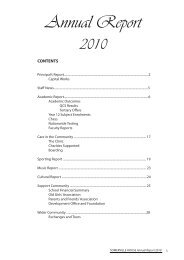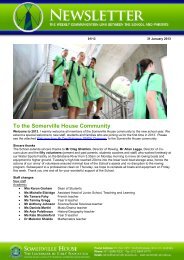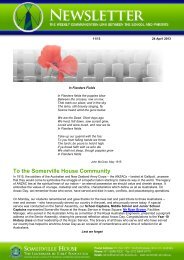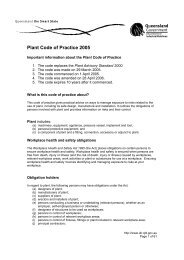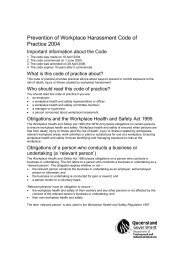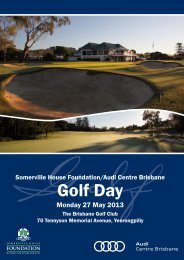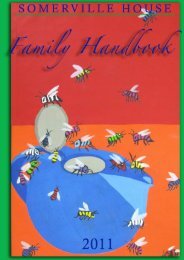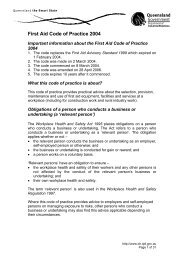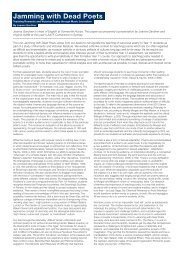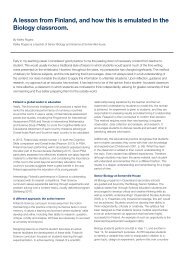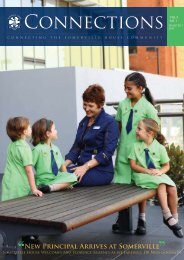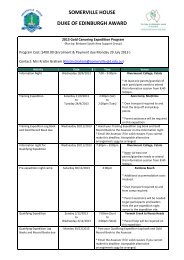To the Somerville House Community
To the Somerville House Community
To the Somerville House Community
Create successful ePaper yourself
Turn your PDF publications into a flip-book with our unique Google optimized e-Paper software.
If you would like to attend our very first Literary Lounge event for 2013, please contact Ms Joanna Gardiner<br />
(jgardiner@somerville.qld.edu.au). Parents are also most welcome to come along.<br />
HEAD OF LANGUAGES<br />
Mr C Forno<br />
LANGUAGES TWILIGHT EVENT<br />
A letter is being emailed later this week to parents of all students in Years 7 to 9 who study any of our four<br />
languages here at <strong>Somerville</strong> <strong>House</strong>, regarding <strong>the</strong> Languages Twilight Event to be held in VPAC on Thursday<br />
28 February from 6.00 to 8.00pm. The event, which is for students and members of <strong>the</strong>ir families, will showcase<br />
Languages study at <strong>Somerville</strong> <strong>House</strong>, and will include student performances in each of <strong>the</strong> four languages.<br />
Parents are requested to complete <strong>the</strong> slip attached to <strong>the</strong> letter, and return by email to Mr Forno by Thursday 21<br />
February.<br />
CHIBA GIRLS’ HIGH SCHOOL VISIT: REQUEST FOR HOST FAMILIES Mrs S-J Feely, Japanese Teacher<br />
This year from 21 July to 30 July, <strong>Somerville</strong> <strong>House</strong> will welcome twenty girls and two accompanying teachers from<br />
our Japanese sister school, Chiba Girls’ High School. For many years this has been a successful homestay<br />
experience and our students of Japanese look forward to welcoming <strong>the</strong> Chiba girls every secondo year. During<br />
<strong>the</strong>ir stay, <strong>the</strong> girls from Chiba study English, under <strong>the</strong> direction of an English-as-a-second-language teacher,<br />
participate in excursions and Japanese classes. I am currently seeking families willing to host a Japanese student.<br />
Host families are required to provide transportation to and from school, meals and accommodation for <strong>the</strong> duration<br />
of <strong>the</strong> home-stay. This real-life international Exchange is a truly valuable experience for students of both <strong>Somerville</strong><br />
<strong>House</strong> and Chiba Girls’ School. An Information Evening will be held for host families to apply for Blue Cards and to<br />
provide more detailed information regarding <strong>the</strong> home-stay program. If you are interested in hosting a student,<br />
please contact Mrs Feely by email 0903@somerville.qld.edu.au or call 3248 9220.<br />
DEAN OF STUDENTS<br />
Mrs K Graham<br />
Well it’s official, words really can hurt us. Lisa Raffensperger’s recent article in <strong>the</strong> New Scientist, ‘Words can<br />
never hurt me?’, confirms what most people already know, that taunting and cruel words actually hurt us in a<br />
physical way as well as psychological way. (Raffensperger: 2012, 37). Researchers like Naomi Eisenberger at <strong>the</strong><br />
University of California have discovered areas of <strong>the</strong> brain – <strong>the</strong> dorsal anterior cingulate cortex (dACC) to be<br />
precise – surges with activity when we are physically hurt. As Eisenberger notes, ‘this is an important part of <strong>the</strong><br />
pain network, determining how upsetting we find an injury’. The more distressing we find an injury, basically <strong>the</strong><br />
more <strong>the</strong> dACC lights up.<br />
Does our brain and body react to insults and social rejection as much as physical pain? It seems so. Researchers,<br />
Ethan Kross at <strong>the</strong> University of Michigan, and Nathan DeWall of <strong>the</strong> University of Kentucky, found that <strong>the</strong> parts of<br />
<strong>the</strong> brain’s sensory centres reflect similar physical discomfort as a result of a wound, as that of heartbreak. In o<strong>the</strong>r<br />
words, ‘heartache can literally hurt’. Some people, on <strong>the</strong> o<strong>the</strong>r hand, are more resilient and are able to deal with<br />
emotional upsets more pragmatically and take setbacks in <strong>the</strong>ir stride. Young people who have experienced more<br />
traumas in <strong>the</strong>ir early years tend to have a more heightened sensitivity to emotional upsets which continues most of<br />
<strong>the</strong>ir lives and <strong>the</strong>se people feel more physical pain than o<strong>the</strong>rs.<br />
Adolescents, particularly, can be sensitive to a whole range of social emotional issues and to social rejection.<br />
Psychiatrists believe that as <strong>the</strong> brain of a young person is still developing, it has a more exaggerated response to<br />
any perceived slights or injustices. This will come as no ground-breaking news to most parents of teenagers.<br />
Is <strong>the</strong>re anything we can do to alleviate this type of pain? The answer, luckily, is a resounding ‘yes’. Giving<br />
emotional support and comfort to those people experiencing painful social rejection can ease <strong>the</strong> physical pain felt,<br />
according to <strong>the</strong> researchers. As parents and educators we can:<br />
• Support young people through difficult emotional times and surprisingly it helps us to become more resilient<br />
to setback in our own lives<br />
• Listen empa<strong>the</strong>tically to our students when <strong>the</strong>y share emotional upsets<br />
• Acknowledge <strong>the</strong> upset and offer advice if your child asks for it<br />
• Comfort young people in times of need and suggest some strategies with o<strong>the</strong>r friends<br />
• Seek medical help if necessary, some short term medication may assist – even panadol has been found to<br />
help reduce <strong>the</strong> effects of psychological pain; and<br />
• Seek help and support from <strong>the</strong> Heads of Year, <strong>the</strong> Dean of Students and <strong>the</strong> trained psychologists at<br />
<strong>Somerville</strong> <strong>House</strong>.<br />
[Bibliography: Raffensperger, L. (2012). Words can never hurt me?. New Scientist. No.2893, December 1, pp37-<br />
39.]<br />
5



